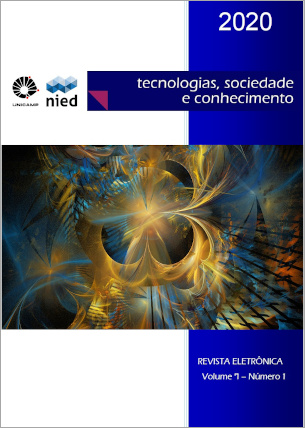Abstract
This paper analyzes an experience of creative learning in the developing unplugged computational thinking (PCD) with the Pipe Project based on Jean Piaget's Genetic Epistemology. Inspired by building blocks, Pipe aims to develop students' cognitive skills, enhancing critical thinking in problem solving. The data were obtained through dialogues established in the learning relationships, algorithms created from the proposed activity and photographic records. We highlight the effectiveness of the use of concrete material in the learning process, the importance of playfulness as a mediator between leisure and learning and the development of computational thinking skills in problem solving situations, generating new meanings for knowledge.
References
ANDRADE, D. et al. Proposta de Atividades Para o Desenvolvimento do Pensamento Computacional no Ensino Fundamental. In: XIX Workshop de Informática Na Escola - II Congresso Brasileiro de Informática Na Educação, 2013. Anais... p. 169 – 178. Disponível em: http://www.br-ie.org/pub/index.php/wie/article/view/2645/2299. Acesso em: 10 mai. 2019.
AURÉLIO. Qual o significado de computação? Disponível em: https://dicionariodoaurelio.com/computacao. Acesso em: abr. 2019.
BECKER, F. Educação e construção do conhecimento. 2a. ed. ed. Porto Alegre: Penso, 2012a.
BECKER, F. Epistemologia Genética: perspectivas e temores. Revista de Psicologia da UNESP, 2012b, p. 81-98. Disponível em: http://seer.assis.unesp.br/index.php/psicologia/article/view/617/570. Acesso em: fev. 2020.
BECKER, F. Abstração Pseudoempírica: significado epistemológico e educacional. Schéme. v.6, n. especial, nov. 2014. p. 104 – 128. Disponível em: https://www.lume.ufrgs.br/bitstream/handle/10183/126295/000970474.pdf. Acesso em: jul. 2019.
BELL, T.; ALEXANDER, J.; FREEMAN, I.; GRIMLEY, M. Computer science without computers: new outreach methods from old tricks. In Proceedings of The 21st Annual Conference of The National Advisory Committee On Computing Qualifications Conference, Auckland, New Zealand. 2008. Anais... p.127 – 133. Disponível em: https://pdfs.semanticscholar.org/185e/07c6891b6c739b6027aa3e2817cd4e6a7f8b.pdf. Acesso em: jul. 2019.
BRACKMANN, C. P. Desenvolvimento do Pensamento Computacional através de Atividades Desplugadas na Educação Básica. 2017. Tese (Doutorado em Informática na Educação). Universidade Federal do Rio Grande do Sul, Porto Alegre. 2017
BORGES, K. S.; MENEZES, C. S.; FAGUNDES, L. C. Projetos Maker Como Forma de Estimular o Raciocínio Formal Através do Pensamento Computacional. In: XXII Workshop de Informática na Escola - V Congresso Brasileiro de Informática na Educação, Uberlândia, 2016. Anais... p. 515-524. Disponível em http://www.br-ie.org/pub/index.php/wie/article/view/6858. Acesso em: jul.2019.
PAPERT, S. Mindstorms: children, computers and powerful ideas. New York: Basic Books, 1980.
PIAGET, J. A equilibração das estruturas cognitivas: problema central do desenvolvimento. Rio de Janeiro: Zahar, 1976.
PIAGET, J. O desenvolvimento do pensamento: equilibração das estruturas cognitivas. Lisboa: Dom Quixote, 1977a.
PIAGET, J. A tomada de consciência. São Paulo: Melhoramentos, 1977b.
PIAGET, J. Abstração reflexionante: relações lógico-aritméticas e ordem das relações espaciais. Porto Alegre: Artes Médicas, 1995. «PIAGET, J. Biologia e Conhecimento: ensaio sobre as relações entre as regulações orgânicas e os processos cognoscitivos. Petrópolis, RJ: Vozes, 1996.
PIAGET, J. Criatividade. In: VASCONCELOS, M. S.(org). Criatividade: psicologia, educação e conhecimento do novo. São Paulo: Moderna, 2001. p. 11-20.
PRIBERAM, Dicionário da Língua Portuguesa. "computação", 2008-2013. Disponível em: https://dicionario.priberam.org/computa%C3%A7%C3%A3o. Acesso em: mar. 2019.
RESNICK, M. Give P’s a Chance: Projects, Peers, Passion, Play. In: CONSTRUCTIONISM AND CREATIVITY. Vienna, Austria. 2014. Anais... Disponível em http://constructionism2014.ifs.tuwien.ac.at/papers/1.2_1-8527.pdf. Acesso em: jul.2019.
RESNICK, M. Lifelong Kindergarten: Cultivating Creativity through Projects, Passion, Peers, and Play. Capítulo 1. MIT Press, 2017. Disponível em: https://learn.media.mit.edu/lcl/resources/readings/chapter1-excerpt.pt.pdf?pdf=ch1-pt. Acesso em: ago. 2019.
WING, J. M. Computational Thinking. Communications of the ACM, v. 49, n.3, mar. 2006, p. 33–35. Disponível em: http://www.cs.cmu.edu/~CompThink/papers/Wing06.pdf. Acesso em: mar. 2019.
WING, J. M. Research Notebook: Computational Thinking--What and Why?. theLink - The magazine of the Carnegie Mellon University School of Computer Science, 2011. Disponível em: http://people.cs.vt.edu/~kafura/CS6604/Papers/CT-What-And-Why.pdf. Acesso em: mar.

This work is licensed under a Creative Commons Attribution 4.0 International License.
Copyright (c) 2020 Karen Selbach Borges, Fabricia Py Tortelli Noronha, Luciana Backes


